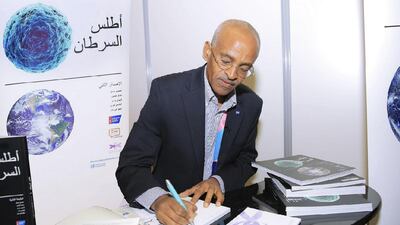The UAE Embassy in Washington has jointly launched the first Arabic-language version of the Cancer Atlas to better promote awareness and prevention tactics to combat the disease.
The document is a comprehensive guide that consolidates research from 185 countries, outlining the cancer landscape and detailing a disease that kills about 400,000 people a year in the Middle East.
Yousef Al Otaiba, UAE Ambassador to the United States and Arnold Baskies, of the American Cancer Society (ACS), launched the Arabic edition in Washington this week.
“With over 4,500 people diagnosed each year, cancer is one of the leading causes of premature death in the UAE,” said Mr Al Otaiba.
“By working with organisations like ACS, healthcare professionals in the UAE can give physicians and regulators better tools to educate the public about this terrible disease, encourage more regular screening and early detection, and raise much needed funds to support patients and families,” he said.
The atlas is used by governments, private and public health agencies and policymakers, as well as patients, survivors and the public.
Its author, Ahmedin Jemal, said the new edition would give access of knowledge and prevention tactics to Arabic speakers who wouldn’t have it otherwise.
Mr Jemal also said it would “reduce the gap between the have and the have nots” in terms of awareness and knowledge about cancer.
The World Health Organisation estimates the number of annual cancer diagnoses in the Middle East will nearly double in the next two decades, heaping pressure on health services, insurers and families.
____________
Read more
30,000 people per year to get lung cancer in the Middle East
Middle East cancer rates expected to double in 20 years, says WHO
UAE's economic success has led to 'sedentary lifestyles and reliance on highly processed food'
____________
Mr Baskies said the UAE's new tax on tobacco and sugary drinks will contribute to the fight against cancer.
Both obesity and diabetes are critical challenges for the UAE population in preventing cancer.
Mr Baskies suggested that the widespread smoking of shisha, popular in the UAE, across the Middle East and North Africa and even in the US, will come into sharp focus.
“We learned the hard way how to stand up to the tobacco industry in this country [US] and other countries are now learning it” he said.
The ACS began its relationship with the UAE through a partnership with The Friends of Cancer Patients Society in 2014. FoCP is a non-profit organisation located in Sharjah, dedicated to raising cancer awareness and providing medical assistance to improve the quality of life of those affected.
Also present was Tomislav Mihaljevic, the CEO of Cleveland Clinic in Abu Dhabi. He praised the UAE’s work with international healthcare organisations to implement preventative measures, increase early detection of the disease, and facilitate world-class treatment in the country and broader region.
Mr Mihaljevic, who will be the CEO of Cleveland Clinic from January, said the branch in Abu Dhabi “has attracted patients from 80 countries, and we were able to replicate standards of care and treatment".
Senior medics including Dr Yousef Al Serkal, Undersecretary of the Ministry of Health and Prevention and Dr Abdulrahman Mohammad Saleh Al Jassmi, CEO of Dubai Hospital, also attended the launch.
The rapid development of the UAE coupled with rising living standards has been linked to a rise in lifestyle-related diseases, including a diet often reliant on highly processed food.
The 4,500 cases seen in the country every year mean on average 12 people are diagnosed every day.
While breast cancer remains the biggest killer in women, colorectal cancer is on the rise in both sexes, largely due to a drastic change in diet.
Health Authority Abu Dhabi figures show, colorectal cancer is now the most common form of the disease in men, and fourth on the list for women, behind cancer of the breast, thyroid and cervix.
"The local UAE diet has changed from wheat, dates, yoghurt and fresh fruit and vegetables to a more Western diet, with more processed food, fatty meat with hormones," said Dr Falah Al Khatib, a consultant clinical oncologist at City Hospital, Dubai, speaking to The National last month. He was involved in the management of nearly 6,000 cancer cases during a decade at the government-run Tawam Hospital in Al Ain.
“There has been rapid change. The type of food brings with it constipation and that brings more toxins into the body.
“More checks in place on what we are eating would help, as would more control though education in families."


